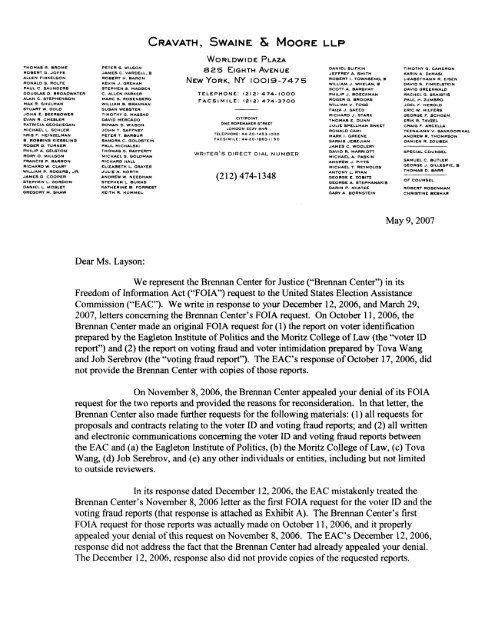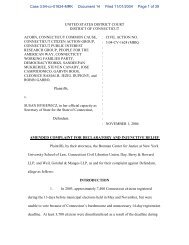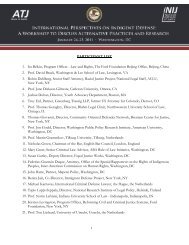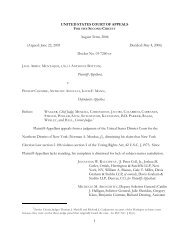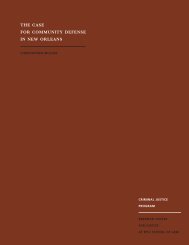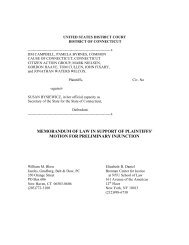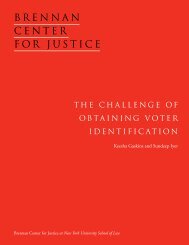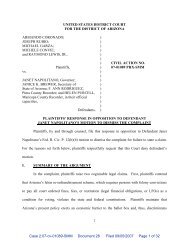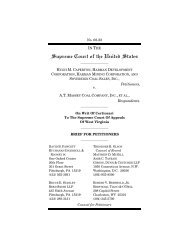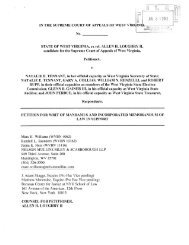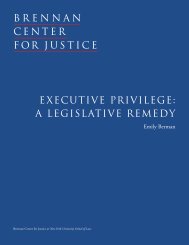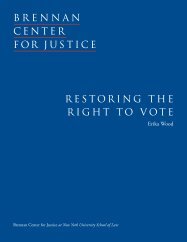CRAVATH, SWAINE & MOORE LLP
CRAVATH, SWAINE & MOORE LLP
CRAVATH, SWAINE & MOORE LLP
You also want an ePaper? Increase the reach of your titles
YUMPU automatically turns print PDFs into web optimized ePapers that Google loves.
<strong>CRAVATH</strong>, <strong>SWAINE</strong> & <strong>MOORE</strong> <strong>LLP</strong><br />
THOMAS R. BROME<br />
ROBERT D. JOFFE<br />
ALLEN FINKELSON<br />
RONALD S. ROLFE<br />
PAUL C. SAUNDERS<br />
DOUGLAS D. BROADWATER<br />
ALAN C. STEPHENSON<br />
MAX R. SHULMAN<br />
STUART W. GOLD<br />
JOHN E. BEERBOWER<br />
EVAN R. CHESLER<br />
PATRICIA GEOGHEGAN<br />
MICHAEL L. SCHLER<br />
KRIS F. HCINZELMAN<br />
B. ROBBINS KIESSLING<br />
ROGER D. TURNER<br />
PHILIP A. GELSTON<br />
RORY O. MILLSON<br />
FRANCIS P. BARRON<br />
RICHARD W. CLARY<br />
WILLIAM P. ROGERS, JR.<br />
JAMES D. COOPER<br />
STEPHEN L. GORDON<br />
DANIEL L. MOSLEY<br />
GREGORY M. SHAW<br />
PETER S. WILSON<br />
JAMES C. VARDELL, m<br />
ROBERT H. BARON<br />
KEVIN J. GREHAN<br />
STEPHEN 3. MADSEN<br />
C. ALLEN PARKER<br />
MARC S. ROSENBERG<br />
WILLIAM B. BRANNAN<br />
SUSAN WEBSTER<br />
TIMOTHY G. MASSAD<br />
DAVID MERC ADO<br />
ROWAN O. WILSON<br />
JOHN T. GAFFNEY<br />
PETER T. SARBUR<br />
SANDRA C. GOLDSTEIN<br />
PAUL MICHALSKI<br />
THOMAS G. RAFFERTY<br />
MICHAEL S. GOLDMAN<br />
RICHARD HALL<br />
ELIZABETH L. GRAYER<br />
JULIE A. NORTH<br />
ANDREW W. NEEDHAM<br />
STEPHEN L. BURNS<br />
KATHERINE B. FORREST<br />
KEITH R. HUMMEL<br />
WORLDWIDE PLAZA<br />
825 EIGHTH AVENUE<br />
NEW YORK, NY IOOI9-7475<br />
TELEPHONE: (212)474-1000<br />
FACSIMILE: (212)474-3700<br />
CITYPOINT<br />
ONE ROPEMAKER STREET<br />
LONDON EC2Y 9HR<br />
FACSIMILE: 44-2O-7860-1 I SO<br />
WRITER'S DIRECT DIAL NUMBER<br />
(212)474-1348<br />
DANIEL SLIFKIN<br />
JEFFREY A. SMITH<br />
ROBERT I. TOWNSENO, m<br />
WILLIAM J. WHELAN, m<br />
SCOTT A. BARSHAY<br />
PHILIP J. BOECKMAN<br />
ROGER G. BROOKS<br />
WILLIAM V. FOGG<br />
FAIZA J. SAEED<br />
RICHARD J. STARK<br />
THOMAS E. DUNN<br />
JULIE SPELLMAN SWEET<br />
RONALD CAM!<br />
MARK I. GREENE<br />
SARKIS JEBEJIAN<br />
JAMES C. WOOLERY<br />
DAVID R. MARRIOTT<br />
MICHAEL A. PASKIN<br />
ANDREW J. PITTS<br />
MICHAEL T. REYNOLDS<br />
ANTONY L. RYAN<br />
GEORGE E. ZOBITZ<br />
GEORGE A. STEPHANAKIS<br />
DARIN P. MCATEE<br />
GARY A. BORNSTEIN<br />
TIMOTHY G. CAMERON<br />
KARIN A. DEMASI<br />
UJZABETHANN R. EISEN<br />
DAVID S. FINKELSTEIN<br />
DAVID GREENWALD<br />
RACHEL G. SKAISTIS<br />
PAUL H. ZUMBRO<br />
JOEL F. HEROLD<br />
ERIC W. HILFERS<br />
GEORGE F. 5CHOEN<br />
ERIK R. TAVZEL<br />
CRAIG F. ARC ELLA<br />
TEENA-ANN V. SANKOORIKAL<br />
ANDREW R. THOMPSON<br />
DAM I EN R. ZOUBEK<br />
SPECIAL COUNSEL<br />
SAMUEL C. BUTLER<br />
GEORGE J. GILLESPIE,<br />
THOMAS D. BARR<br />
OF COUNSEL<br />
ROBERT ROSENMAN<br />
CHRISTINE BESHAR<br />
May 9, 2007<br />
Dear Ms. Layson:<br />
We represent the Brennan Center for Justice ("Brennan Center") in its<br />
Freedom of Information Act ("FOIA") request to the United States Election Assistance<br />
Commission ("EAC"). We write in response to your December 12, 2006, and March 29,<br />
2007, letters concerning the Brennan Center's FOIA request. On October 11, 2006, the<br />
Brennan Center made an original FOIA request for (1) the report on voter identification<br />
prepared by the Eagleton Institute of Politics and the Moritz College of Law (the 'Voter ID<br />
report") and (2) the report on voting fraud and voter intimidation prepared by Tova Wang<br />
and Job Serebrov (the "voting fraud report"). The EAC's response of October 17, 2006, did<br />
not provide the Brennan Center with copies of those reports.<br />
On November 8, 2006, the Brennan Center appealed your denial of its FOIA<br />
request for the two reports and provided the reasons for reconsideration. In that letter, the<br />
Brennan Center also made further requests for the following materials: (1) all requests for<br />
proposals and contracts relating to the voter ID and voting fraud reports; and (2) all written<br />
and electronic communications concerning the voter ID and voting fraud reports between<br />
the EAC and (a) the Eagleton Institute of Politics, (b) the Moritz College of Law, (c) Tova<br />
Wang, (d) Job Serebrov, and (e) any other individuals or entities, including but not limited<br />
to outside reviewers.<br />
In its response dated December 12, 2006, the EAC mistakenly treated the<br />
Brennan Center's November 8, 2006 letter as the first FOIA request for the voter ID and the<br />
voting fraud reports (that response is attached as Exhibit A). The Brennan Center's first<br />
FOIA request for those reports was actually made on October 11, 2006, and it properly<br />
appealed your denial of this request on November 8, 2006. The EAC's December 12, 2006,<br />
response did not address the fact that the Brennan Center had already appealed your denial.<br />
The December 12, 2006, response also did not provide copies of the requested reports.
On December 12, 2006, the EAC did produce a handful of documents<br />
responsive to the Brennan Center's request and withheld others on a claim of deliberative<br />
process privilege. On March 29, 2007, the EAC produced additional materials, consisting of<br />
printouts of certain e-mails dealing with the requested reports. However, although the EAC<br />
indicated that it was producing 1500 pages of responsive materials, its actual production<br />
consisted of only about 800 pages. From our review of the documents produced, we believe<br />
that the EAC's production does not reflect the "reasonable" searches required by FOIA. 5<br />
U.S.C. §§ 552(a)(3)(C) and (D). The EAC has a duty to search for responsive documents<br />
wherever it is reasonable to expect that such documents may be located. See Valencia-<br />
Lucena v. U. S. Coast Guard, 180 F.3d 321, 327 (D.C. Cir. 1999) (holding search<br />
inadequate when "the record ... reveals positive indications of overlooked materials",<br />
including "failure to search the center [the agency] had identified as a likely place where the<br />
requested documents might be located" and failure to speak to the person who "would be a<br />
likely source for information"); Juda v. U. S. Customs Service, No. 99-5333, 2000 U.S. App.<br />
LEXIS 17985, at *2 (D.C. Cir. Jun. 19, 2000) (denying summary judgment to agency<br />
because agency not only failed "to pursue clear leads to other existing records", but also that<br />
the agency itself had "identified at least one other record system ... that is likely to produce<br />
the information" requested).<br />
The EAC's production is deficient in several respects. First, it appears that<br />
the EAC has searched the files of only two employees: Margaret Sims and Karen Lynn-<br />
Dyson. The e-mails produced from their files establish that several other EAC employees,<br />
whose files were not searched, communicated with the two sets of researchers and/or<br />
participated in other communications concerning the two reports at issue. Second, the<br />
EAC's production includes no other documents aside from those e-mails; there are no<br />
attachments to the e-mails, nor are there other documents reflecting communications about<br />
the reports. Third, the EAC's production is in an unclear format: the e-mails all run together<br />
without any clear separators between documents, some of the e-mails are incomplete or cut<br />
off and the redactions are inconsistent.<br />
To remedy those deficiencies, we ask the EAC to provide all documents<br />
(including e-mails, attachments, and non-e-mail communications) from the other EAC<br />
Commissioners and employees relating to the two reports at issue, including but not limited<br />
to correspondence with the two sets of researchers, peer reviewers, employees of the U.S.<br />
Department of Justice, Commissioners and staff members of the Federal Election<br />
Commission, other administration officials, members of Congress and members of the<br />
general public. The EAC Commissioners and other employees in question include, but are<br />
not limited to: Donetta Davidson, Paul DeGregorio, Gavin Gilmour, Brian Hancock, Gracia<br />
Hillman, Julie Thompson Hodgkins, Caroline Hunter, Ray Martinez, Brian Whitener and<br />
Thomas Wilkey. We also request all non-e-mail communications from Margaret Sims and<br />
Karen Lynn-Dyson. Finally, although we are entitled to production of all the missing e-mail<br />
attachments, as Ms. Wendy Weiser had discussed with you, we will provide you a list of the<br />
particular missing e-mail attachments we seek at this point.<br />
Furthermore, for the reasons set forth in the Brennan Center's letter of<br />
November 8, 2006, we believe that the EAC is improperly invoking the deliberative process
privilege. We ask that the EAC produce a detailed index of the documents that the EAC has<br />
withheld, including but not limited to the 300 pages that were mentioned in the EAC's<br />
March 29, 2007, response, along with any additional documents the EAC has withheld<br />
under a claim of privilege. See Vaughn v. Rosen, 484 F.2d 820 (D.C. Cir. 1973). Vaughn<br />
suggests that agencies should provide this type of index during the FOIA request process<br />
and before it is required in litigation to ensure that "a party's right to information is not<br />
submerged beneath governmental obfuscation and mischaracterization...", and to prevent "a<br />
situation in which the Government need only carry its burden of proof against a party that is<br />
effectively helpless and a court system that is never designed to act in an adversary<br />
capacity". 484 F.2d at 826. See also Judicial Watch v. Food & Drug Admin., et al, 449<br />
F.3d 141,146 (D.C. Cir. 2006) ("The Vaughn index.. .[helps] restore a healthy adversarial<br />
process [by forcing] the government to analyze carefully any material withheld, [enabling]<br />
the trial court to fulfill its duty of ruling on the applicability of the exemption, and [enabling]<br />
the adversary system to operate by giving the requester as much information as possible, on<br />
the basis of which he can present his case to the trial court"); Oglesby v. U. S. Dep 't of<br />
Justice, No. 02-603, 2007 U.S. Dist. LEXIS 13229, at *6 (D.D.C. Feb. 27, 2007) ("In order<br />
for a FOIA challenge to be meaningful, the agency resisting disclosure of the records must<br />
disclose sufficient information about the records to permit a FOIA plaintiff to make an<br />
informed opinion about whether the agency has complied with the law and to present its<br />
case effectively to the court") (internal citations omitted).<br />
Finally, in the EAC's December 12, 2006, and March 29, 2007, letters, the<br />
EAC advised that its productions of documents were only a "partial response" to the<br />
Brennan Center's FOIA requests and requested that the Brennan Center "hold any appeal<br />
until [its] request has been fully addressed". More than six months have passed since the<br />
Brennan Center's original FOIA request. The Brennan Center has exhausted all of its
administrative remedies. 1 We ask that the EAC either complete its response immediately or<br />
act on the Brennan Center's appeal.<br />
Sincerely,<br />
Jeannie Layson<br />
Director of Communications<br />
U.S. Election Assistance Commission<br />
1225 New York Avenue, N.W., Suite 1100<br />
Washington, DC 20005<br />
VIA E-MAIL AND FIRST CLASS MAIL<br />
Copy to:<br />
Wendy R. Weiser<br />
Myrna Perez<br />
Brennan Center for Justice<br />
161 Avenue of the Americas, 12th Floor<br />
New York, NY 10013<br />
VIA E-MAIL AND FIRST CLASS MAIL<br />
Copies to:<br />
Honorable Dianne Feinstein<br />
Chairman, Committee on Rules and Administration<br />
United States Senate<br />
305 Russell Building<br />
Washington, DC 20510<br />
Rowan D. Wilson<br />
Yani Indrajana Ho<br />
1 The EAC was statutorily obligated to rule on the Brennan Center's November 8,<br />
2006 appeal within 20 days. 5 U.S.C. § 552(a)(6)(A)(ii). Its failure to do so constitutes<br />
exhaustion of the Brennan Center's administrative remedies. See 5 U.S.C. 552(a)(6)(C)(i);<br />
The New York Times Company v. U. S. Dep't. of Labor, 340 F. Supp. 2d 394 (S.D.N.Y.<br />
2004).
Honorable Robert F. Bennett<br />
Ranking Member, Committee on Rules and Administration<br />
United States Senate<br />
305 Russell Building<br />
Washington, DC 20510<br />
Honorable Robert A. Brady<br />
Chairman, Committee on House Administration<br />
United States House of Representatives<br />
1309 Longworth Building<br />
Washington, DC 20515<br />
Honorable Vernon J. Ehlers<br />
Ranking Member, Committee on House Administration<br />
United States House of Representatives<br />
1309 Longworth Building<br />
Washington, DC 20515<br />
Honorable Zoe Lofgren<br />
Chair, House Administration Subcommittee on Elections<br />
United States House of Representatives<br />
102 Cannon House Office Building<br />
Washington, DC 20515<br />
Honorable Maurice D. Hinchey<br />
United States House of Representatives<br />
2431 Rayburn House Office Building<br />
Washington, DC 20515<br />
Honorable Carolyn B. Maloney<br />
United States House of Representatives<br />
2331 Rayburn House Office Building<br />
Washington, DC 20515<br />
Honorable Jose E. Serrano<br />
United States House of Representatives<br />
2227 Rayburn House Office Building<br />
Washington, DC 20515<br />
VIA FACSIMILE AND FIRST CLASS MAIL
EXHIBIT A
U.S. ELECTION ASSISTANCE COMMISSION<br />
1225 New York Ave. NW - Suite 1100<br />
Washington, DC 20O05<br />
December 12, 2006<br />
Ms. Wendy R. Weiser<br />
Deputy Director, Democracy Program<br />
Brennan Center for Justice<br />
161 A venue of the Americas, 12* Floor<br />
New York, NY 10013<br />
Dear Ms. Weiser:<br />
This letter is in response to your Freedom of Information Act (FOIA) request received by the U. S.<br />
Election Assistance Commission (EAC) on November 13, 2006. The request sought certain agency<br />
records concerning two agency draft reports, The Voter Fraud and Intimidation Report and The Voter<br />
Identification Report. Specifically, the request sought: (1) "the report on voter identification prepared by<br />
the Eagleton Institute of Politics and the Moritz College of Law," (2) "the report on voter fraud and voter<br />
intimidation prepared by Tova Wang and Job Serebrov," (3) The voter identification and voting fraud<br />
report requests for proposals and contracts, and (4) communications relating to the above reports between<br />
the EAC and Eagleton Institute of Politics, the Moritz College of Law, Ms. Tova Wang, Mr. Job<br />
Serebrov, or other third parties.<br />
This letter is a partial response to your request and deals only with your request for documents consistent<br />
with items (1) - (3), above. With regard to item (4), we continue to search our files, e-mails and<br />
computers for all relevant communications. We expect to have all relevant, releasable documents<br />
collected, reviewed and sent to you within five working days. If you have any questions regarding this<br />
process, please contact the undersigned.<br />
With regard to items (1) - (3) above, please find copies of all responsive contracts and request for<br />
proposals enclosed. Upon review of the records, you will find a few places where small portions of<br />
information have been redacted (in black). As required by FOIA exemption 6, the EAC has redacted<br />
certain pieces of personal information, including home addresses, telephone numbers, and personal e-<br />
mail addresses. The EAC has also redacted confidential commercial information as mandated by FOIA<br />
exemption 4. Specifically, the EAC has redacted information that can be used to calculate unit costs<br />
regarding a contractor's labor rates. With regard to your requests for "the report on voter identification<br />
prepared by the Eagleton Institute of Politics and the Moritz College of Law," and "the report on voter<br />
fraud and voter intimidation prepared by Tova Wang and Job Serebrov," these draft documents are<br />
predecisional drafts protected by the Deliberative Process Privilege and exempted from release under 5<br />
U.S.C. §522(bX5).<br />
As you may know, the Deliberative Process Privilege protects intra-agency documents that are (1) predecisional<br />
in nature and (2) part of the deliberative process. In other words, the documents must be part<br />
of a process that recommends or presents opinions on a policy matter or governmental decision before<br />
that matter is finally decided. It is a well settled matter of law that the work of contract employees and
contractors ("consultants") constitute intra-agency documents. 1 This is true even where the consultants<br />
are deemed to be independent contractors and are not subject to the degree of control that agency<br />
employment entails. 2 The courts have made this determination after recognizing that agencies have a<br />
special need for the opinions and recommendations of temporary consultants. 3 Ultimately, deliberative<br />
documents are exempt from release (1) to encourage open and frank discussions on policy matters<br />
between agency subordinates and superiors, (2) to protect against premature disclosure of proposed<br />
policies and (3) to protect against public confusion that might result from disclosure of rationales that<br />
were not in fact the ultimate basis for agency action. 4<br />
In both cases, the reports you have requested are drafts, representing one phase of the deliberative<br />
process—before the document was vetted by staff, approved by the executive director and reviewed and<br />
approved by the Commissioners (the relevant policy makers). Ultimately, the draft documents were<br />
created by experts to aid the EAC's Commissioners in their decisions. The consultants had no personal<br />
interest in their submissions and had no agency decision-making authority. Each was tasked with simply<br />
providing pre-decisional research and information to the EAC. Their efforts were limited to creating<br />
truthful and comprehensive draft reports. Finally, both reports when finalized would constitute an EAC<br />
decision or a policy determination.<br />
These conclusions are bom out in the facts surrounding the projects at issue, including the attached<br />
contract documents. First, the voter fraud and intimidation study you have requested is a draft of a final<br />
document that has already been released after being vetted by staff and approved by the EAC<br />
Commissioners. It is available in its final form on EAC's website (www.eac.gov). The draft document<br />
at issue was created by two contract employees hired pursuant to 5 U.S.C. §3109 (see 42 U.S.C.<br />
§ 15324(b)). Individuals hired under this authority enter into an employment relationship with the EAC.<br />
The contract employees were supervised by an EAC program director who participated directly in the<br />
project. For example, the supervisor approved, facilitated, scheduled and participated in interviews<br />
conducted for the project. Further, the contract employees were provided research materials and other<br />
support from EAC law clerks and staff. As stated by their contract, these consultants were hired so that<br />
the EAC could ".. .obtain consulting services from an individual who can provide advice drawn from<br />
broad professional and technical experience in the area of voter fraud and intimidation." 5 Moreover, the<br />
contracts clearly forbid the consultants from releasing the draft they created consistent with the privilege<br />
the EAC is asserting. The contract states:<br />
All research, information, documents, and any other intellectual property (including<br />
but not limited to policies, procedures, manuals, and other work created at the request<br />
or otherwise while laboring for the EAC) shall be owned exclusively by the EAC,<br />
including copyright. All such work product shall be turned over to the EAC upon<br />
completion of your appointment term or as directed by the EAC. The EAC shall have<br />
exclusive rights over this material. You may not release government information or<br />
documents without the express written permission of the EAC. 6<br />
1 Department of the Interior v. Klamath Water Users Protective Association. 532 U.S. 1,9-11 (2001) (Citing Harry<br />
E. Hoover v. Pent, of the Interior. 611 F.2d 1132, at 1138 (1980); Lead Industries Assn. v. OSHA, 610 F.2d 70, 83<br />
(C.A.5 1980) (applying exemption 5 to draft reports prepared by contractors); and Government Land Bank v. GSA.<br />
671 F.2d 663, 665 (CA1 1982)); See also Hertzberg v. Veneman. 273 F. Supp. 2d 67, 76 n.2 (D.D.C. 2003).<br />
2 Klamath. at 10.<br />
3 Hoover.611F.2d at 1138.<br />
4 NLRB v. Sears. Roebuck & Co.. 41 U.S. at 151.<br />
5 See the consultant contracts for Job Serebrov and Tova Wang, enclosed.<br />
e See Id.
Finally, the purpose or subject of the draft report at issue was to make an EAC determination on how<br />
voter fraud should be studied by the agency. This was to be done by (1) accessing the nature and quality<br />
of the information that presently exists on the subject matter, (2) defining the terms and scope of EAC<br />
study as proposed by HAVA, (3) determining what is to be studied and (4) determining how it is to be<br />
studied. EAC's interpretation of HAVA and its determination of what it will study and how it will use its<br />
resources to study it are matters of agency policy and decision.<br />
With regard to the Voter Identification draft, it was created by Rutgers University in conjunction with the<br />
Moritz College of Law (Ohio State University) to ".. .provide research assistance to the EAC for the<br />
development of voluntary guidance on provisional voting and voting identification procedures." 7 The<br />
stated objective of the contract was to:<br />
...obtain assistance with the collection, analysis and interpretation of information<br />
regarding HAVA provisional voting and voter identification requirements for the<br />
purpose of drafting guidance on these topics... The anticipated outcome of this activity<br />
is the generation of concrete policy recommendations to be issued as voluntary guidance<br />
for States. 8<br />
As with the voter fraud and intimidation study mentioned above, the contractors were provided<br />
guidance, information, and were directed by EAC personnel. The final product they delivered<br />
(draft report sought) was identified as "a guidance document for EAC adoption." Clearly, as<br />
noted by the contract, the issuance of Federal guidance to states is a matter of government policy<br />
and limited to official EAC action.<br />
The EAC has decided to waive the processing fees for your request. If you interpret any portion of this<br />
response as an adverse action, you will have an opportunity to appeal it to the Election Assistance<br />
Commission. However, as this letter is only partially responsive to your request, please hold any appeal<br />
until your request has been fully addressed. At that time, your appeal must be in writing and sent to the<br />
address noted on the above letterhead. Any appeal submitted, must be postmarked no later than 60<br />
calendar days from the date of EAC's final response letter. Please include your reasons for<br />
reconsideration and attach a copy of this and subsequent EAC responses.<br />
y-\Sincerely.<br />
^I //<br />
>• v<br />
(Jeannie Layson<br />
rector of Communications<br />
U.S. Election Assistance Commission<br />
Attachments:<br />
1. Your Request Letter (dated November 8, 2006)<br />
2. Responsive Documents<br />
7 See EAC Contract, Act Number E4014127 (enclosed).<br />
s See Id.


